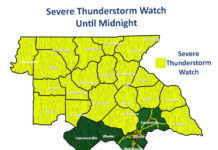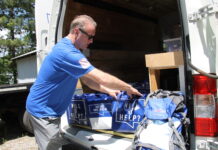
Winter’s sub-freezing temperatures can wreak havoc on pipes, and that is no laughing matter.
The pipes that freeze most frequently are those exposed to severe cold, like outdoor hose bibs, swimming pool supply lines, and water sprinkler lines.
If your water supply pipes are in an unheated interior area like basements and crawl spaces, attics, garages, or kitchen cabinets, the likelihood of freezing is higher.
Pipes that run against exterior walls that have little or no insulation are also at risk.
Know what to do
Trent Davis of Dockery Heating & Air in Cornelia, Georgia, offered some suggestions to help prevent frozen pipes. “Once temperatures reach the ‘hard freeze’ range of 27 or below, and the high of the day never gets above 32, even dripping pipes will freeze.”
Davis said the most common items to freeze and burst are hose bibs (a faucet outside a home that connects to the main water line and allows you to access water). “Make sure all water hoses are disconnected, and the hose bib itself is covered,” Davis said.
If your pipes freeze or burst, cut your water off at the meter (next to the road or at the well pump) and wait for everything to thaw. Davis advised, “If you don’t know where your meter is or do not know how to turn it off, call your water provider, and they will show you where and how to do this.”
It is important to note that once the temperatures are higher and the lines have thawed, turn the meter on halfway and inspect the lines.
Frozen pipes in the past
If you have had frozen pipes in the past, a sure way to prevent them is to turn the water off at the meter and open all fixtures and hose bibs to drain the house.
Davis suggests switching your thermostat to emergency heat mode for those with a total electric heat pump HVAC system. The outdoor unit cannot produce heat at 35 and below. With a newer gas 90% efficient furnace with plastic flue pipe, there is a good chance your drain line will freeze. If this occurs, Davis recommends using a thin rod to break up the ice and tap on the line until the ice falls out.
If you have a newer gas furnace in an attic, Davis said there isn’t much you can do to keep the condensation line from freezing. He said to be prepared for a blank thermostat unit when the unit thaws.
Prepare before the freeze
White County Public Safety suggests that if your pipes run through cabinets or vanities, open the doors to let warmer room temperatures flow into them. Allowing a small trickle of water to run through the pipes can also help prevent frozen pipes.
Have a supply of water handy. Fill up a bathtub, buy bottled water, or fill up jugs ahead of time to help while waiting for the temperatures to rise.







